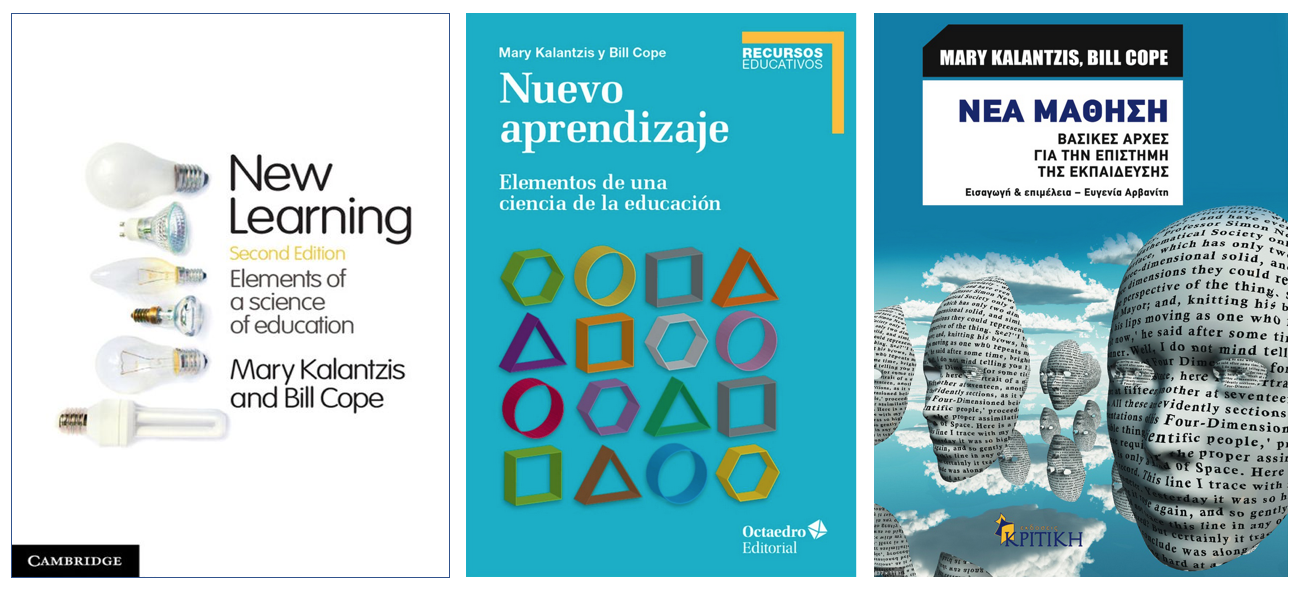For regular New Learning posts, join our CGScholar community, Facebook group, and X feed.

- Kalantzis, Mary and Bill Cope, New Learning: Elements of a Science of Education, Cambridge UK/Champaign IL: Cambridge University Press/Common Ground Research Networks, 2008-2023.
- Translated as Νέα μάθηση, Kritiki, Athens, Greece, 2013, 481pp. Visit the website here.
- Translated as Nuevo Aprendiza, Ediciones Octadro, Barcelona, Spain, 2018, 384pp. Visit the website here.
- Coming soon in Portuguese, Russian and Chinese editions.
Re-visioning Education
This part of the Works and Days website contains the full English language text of and supplementary materials of New Learning: Elements of a Science of Education.
New Learning rethinks the enterprise of education, starting with the fundamentals of learning. How is it that humans come to know, as individuals and collectively? The discipline of education is not just the stuff of institutions and their processes. It is about this foundational and expansive question of knowing. This is especially the case today when more and more of what we need to know is being learnt outside of formal educational institutions.
We set out to recover the roots of the discipline of education, then redefine its scope and position amongst the sciences and the practical arts. We also consider the sites and shapes of a genuinely ‘new learning’ in which the dynamics and places of learning may be quite different from our recent modern experiences.
In so doing, we attempt to raise the intellectual bar for education as a discipline. Too often, education is a messy amalgam of other disciplines—psychology, sociology, humanities, management and the like. New Learning attempts to position education clearly and firmly as a metadiscipline or discipline of disciplines—whose concern is no less than the foundation of human knowledge and identity, and the source of all other disciplines.
Too often also, the discipline of education as we know it today sets its intellectual sights lower than it should. Foundations texts in education are mostly not very challenging, at least compared to, say, introductory texts in the sciences, technology or social sciences. New Learning does not avoid challenging ideas as it attempts to redefine the field of education in theoretical terms, for academics and practitioners as well as beginning education students.
The Book also considers the enormously disruptive changes that education currently faces—greater than those at any time since the beginnings of mass education in the nineteenth century. These changes challenge the fundamentals of education as we know it—globalisation, social diversity, new technologies and new kinds of learners who expect to be agents in the making of their knowledge and identities rather than receptacles of transmitted content.
Join Our Courses!
"New Learning" also available in these course formats. Join:
- Our series of MOOCs.
- Our highly ranked Learning Design and Leadership program, offering certificates, masters and doctoral degrees.
Teach "New Learning"!
- Use the videos and supplementary materials on this website to support teaching the "New Learning" book as an introductory education textbook.
- Use our CGScholar e-learning platform to teach "New Learning" in Learning Module format.
